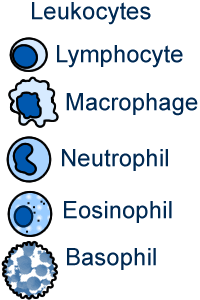Bored to Death

A real neutrophil with a nucleus shaped like a question mark. A neutrophil is a type of granulocytic white blood cell and is an integral part of our immune system. Perhaps this oddly shaped nucleus is evidence of Intelligent Design? Naaaaw!
For the first time since I've started teaching at the little college on the hill, I gave a lecture to my students that made me happy. I gave them an overview of blood (erythrocytes, leukocytes and platelets) and the lymphatic system, as required. But because I thought this lab was severely lacking in any interesting activities, I then used this required information as the background for a brief introduction to the wonders of the immune system
 and how it functions, the similarities and differences between immune response to bacterial infections versus viral infections, and then I discussed some cutting-edge research about the immune response to cancer and the relationship between immune cells, depression and cancer. Talking openly about these very interesting subjects cut through my own despondency and made me want to design a graduate-level course (or write a book) that addresses these topics.
and how it functions, the similarities and differences between immune response to bacterial infections versus viral infections, and then I discussed some cutting-edge research about the immune response to cancer and the relationship between immune cells, depression and cancer. Talking openly about these very interesting subjects cut through my own despondency and made me want to design a graduate-level course (or write a book) that addresses these topics. I am not sure if any of my students learned anything from my lecture, although I'd like to believe they did, but at this point, I don't care. For the first time this semester, I was satisfied and that is all that counts right now. The oddest thing about this? I relied on only a few notes to remind me of the basic facts because I am going to examine them over those, so I wanted to make sure I didn’t accidentally misstate this information to them. But I did not write out my lecture in meticulous detail and in advance as I always do. I just talked to my students about what I think is so very interesting about these related topics. My thoughts and words came so easily, as if I was describing a series of events as they occurred in front of me, and my students' questions wonderfully anticipated the next topic that I was going to talk about .. how did they do that? I almost felt like a tour guide leading them on a great adventure; a great adventure of the mind.
Unfortunately, for the next few weeks, I am back to delivering "canned" lectures, although I think this will be fine since my students will be learning about the circulatory, respiratory and digestive systems. As a result, they will have some interesting dissections to keep them engaged so an interesting lecture is probably not necessary. Incidentally, last week, the lab technician told me that I am the only professor in this class that delivers a lab lecture at all, the others just spend ten minutes or so telling the students what they are supposed to be doing that week in lab, but provide no other background or contextual information. Yet, despite my devotion to detail, I am the only professor who is spot-on target with the course syllabus; all of the other classes have fallen behind, some of them are three weeks behind where they are supposed to be. Gah! It's no wonder that more than half of the students in the class are failing! The professors' apathy is killing them: They're bored out of their skulls!
I decided that my students can anticipate one more "fun" lecture from me, at the end of the semester (if I feel equal to it). Our lab covers the endocrine system on the last week of the semester, and a quick glance ahead in the book reveals that the lab manual succeeds once more in transforming another intriguing living phenomenon (endocrinology) into a boring exercise in rote memorization. However, I am just the person to remedy that situation: Because I researched the relationship between hormones and behavior in birds for my dissertation, I told my students today that I will give them a lecture about the mechanisms of how hormones cause changes in behavior and physiology. Like today's lecture, my upcoming presentation about hormones will be another lecture that requires my students to have mastered previous material covered in the class. If they have mastered it, I think this lecture will help them to better understand those previously memorized facts because they will have a context for them and context provides relevance. And relevance is what this entire course lacks. In fact, it's downright embarassing to be part of this particular course.
After all my subversive lectures have been delivered, I am sure the little college on the hill will fire me (I am too different from what they seek in an adjunct, they say). Or (because I agree with them), maybe I will quit and pursue homelessness as a viable life option? That seems to be the only option remaining since I can't find a satisfying job that pays a living wage. Of course, at this point, I am too disillusioned to care.
tags: academics, teaching, science, biology
© 2004, 2005, 2006 by GrrlScientist











5 Peer Reviews:
I can't tell you how much I wish I had been sitting in that lecture. It sounds exactly like the kind of lectures that I loved. When you know and love your material, when it excites and stimulates you, it absolutely can invigorate the minds of your students. How teaching became so dull and deadening is beyond me, but if it is subversive to be stimulating-- then break all the rules!
Well, being rather anonymous on this forum as you yourself are.. all I can say is that I know there may be an adjunct position, and a full time, albeit contract faculty (non-tenure school) position opening at a downtown NYC university teaching science to non-majors, so if you are willing to do that homelessness might not be necessary. I'd say keep an eye on The Chronicle (set up a bot to send you jobs) in the next couple of months.
Sounds like a wonderful pair of lectures to me. My feeling from the classes I've taught is that college students are expert at telling whether you're involved or just phoning it in, and that some of them will respond in kind. So here's hoping that it keeps mattering to you, because I think it keeps it mattering to the students.
Keeping students interested is always a battle in any lecturing environment. The current UK trend towards increasing student numbers and lowering costs isn't helping; more and more practicals are just demos, with no hands-on experience at all.
Of the few tricks I've seen to wake up students: In a dry-as-dust microscopy lecture, the slide of a rather well-endowed lady wearing an overstrained labcoat certainly woke up the back row, unfortunately making them noisy too.
For waking students up in a practical,try making them think hard about how to set up an experiment (or get nil points for the prac), or in a demo slip in a ringer (a specimen that is a complete fraud) with bonus marks for working out which it is.
RD; thanks for your comment. I am actually frustrated with this teaching gig (I am sure you can tell, I am not exactly keeping my feelings secret in this essay). I don't think this school wants students to teach at all; instead, from what I see and hear around me, they want to maintain an atmosphere of barely concealed hostility to exist between the faculty and the students. I find that revolting and, if I was a student at my little college, I'd be inspired to revolt.
Anonymous; thanks for the tip. I'll apply for the position when I find it.
Joe; thanks. Some of my students really love me, but there are a few who are hellions -- who don't care and don't want to be around anyone who does care. Why don't they care? I have no idea, but I suspect they don't want to be shaken from their complacent little world view where they are not required to think for themselves and where everything is taken care of for them.
Joel the Bowerbird; thanks. I agree; this is true for most students (but not all).
Dr. Dan H; you'd think that the UK would just look at what is happening to the USA's educational system; we already tried that experiment and it didn't work! But alas, I suspect that providing students with a real education is not the goal; our society is becoming more hierarchical (rather than less), based on who one's family is and how much money they have. Educational opportunities appear to reflect and often intensify this social sorting.
GrrlScientist
Post a Comment
<< Home